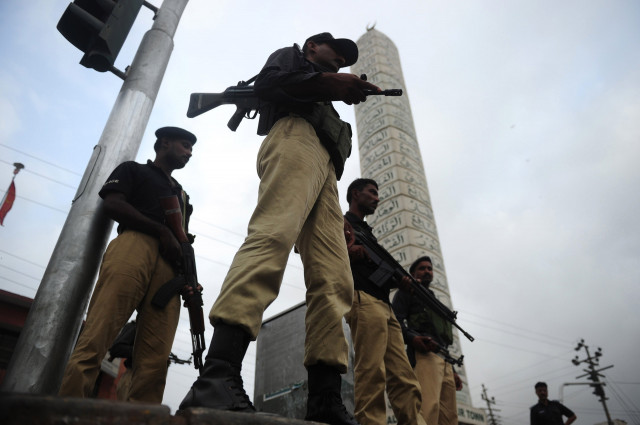Streamlining services: Provinces propose system for police stations
Punjab, Sindh govts submit recommendations in SC to adopt computerised records and complaint management systems.

Service centres at all the police offices will offer all police-related services at one-window with an electronic queue system and with a computer generated complaints monitoring mechanism.PHOTO: AFP
Provincial authorities in Punjab and Sindh shared a litany of recommendations with the apex court on Saturday on overhauling mechanisms at police stations, equipping them with the latest tools to handle complaints and making them more people-friendly and efficient.
Kamran Adil, AIG legal Punjab police, while submitting a report regarding the improvement of criminal justice system in the province, has told the top court that “complaint handling at the Central Police Offices is going to be an electronic system backed by SMS technology for communicating the complaint.” Senior officers , according to Adil, will ensure action on each complaint.
Service centres at all the police offices will offer all police-related services at one-window with an electronic queue system and with a computer generated complaints monitoring mechanism.
The report claims that there is a mechanism for complaint handling at all levels and in the office of IG Punjab, there is elaborate complaints mechanism to deal with day-to-day complaints.
It reveals that the open court branch dealt 3,932 cases of different categories of cases in last year. Besides, the Inspection and Vigilance Cell was constituted to play the role of internal accountability system.
The report further stated that the timelines are being adhered to religiously and professionally. There are similar mechanisms at all the offices of RPOs, DPOs and SDPOs.
In Sindh, meanwhile, the authorities are planning to establish a provincial criminal justice coordination committee for the monitoring of investigation, operation and prosecution of the criminal cases.
This was shared by the Sindh home department in its report. “To establish monitoring for the Criminal Justice System, investigation, operation, prosecution of the criminal cases and formulation of coordination and cooperation among the different departments, judiciary and improvement for better investigation and prosecution, a provincial criminal justice coordination committee is recommended to established as it was provided in the police order by necessary amendments in Police Act.”
It recommended that the committee be headed by the chief justice of a high court or a judge nominated by the chief justice, whereas home secretary, IG police, IG prisons, advocate general, prosecutor general, district judges police surgeon and provincial head of forensic agency are proposed as members.
To redress the grievances of general public and curb malpractice and abuse of power by the police officers, an independent, non-political and non-bureaucratic ‘District Complaint Authority’ is to be established by amendment in the Police Act.
“The composition of the ‘District Complaint Authority’ is to be comprising on, retired judge, reputable civil society members, retired police officers and also adequate/note worthy, non-political and effective representative outside of police department”, it adds.
The authority shall receive complaints in writing on an affidavit from aggrieved person of serious nature, neglect excess, misconduct. wrongful confinement, torture harassment, report of death and injury in police custody and others and allegations of serious nature with evidence, adding that authority shall collect the evidence, enquire the matter and take appropriate action against delinquent police officers.
For the improvement in quality of investigation, the report says that investigation officers will be trained with the help of the United States, UNOC, France and Australia.
Published in The Express Tribune, February 22nd, 2015.



















COMMENTS
Comments are moderated and generally will be posted if they are on-topic and not abusive.
For more information, please see our Comments FAQ